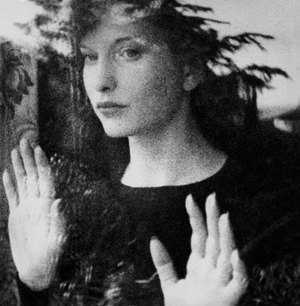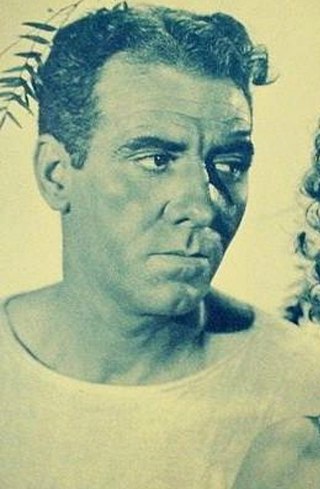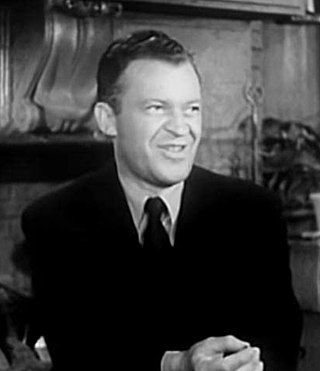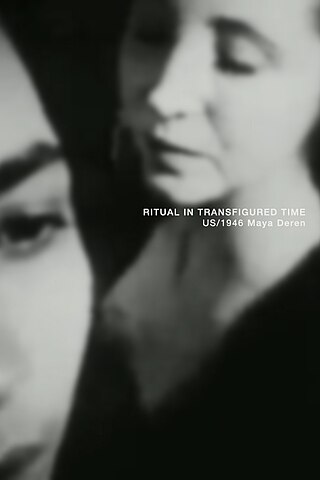Rita Christiani | |
|---|---|
 | |
| Born | December 22, 1917 |
| Died | May 23, 2008 (aged 90) |
| Occupation(s) | Dancer Actress |
| Years active | 1940s |
Rita Christiani (1917-2008) was a Trinidad-born American dancer who appeared in American films during the 1940s.
Rita Christiani | |
|---|---|
 | |
| Born | December 22, 1917 |
| Died | May 23, 2008 (aged 90) |
| Occupation(s) | Dancer Actress |
| Years active | 1940s |
Rita Christiani (1917-2008) was a Trinidad-born American dancer who appeared in American films during the 1940s.
Christiani was born in Port of Spain, Trinidad on December 22, 1917. [1]
She danced and toured with the Katherine Dunham Company in the early 1940s. [2] In the course of touring, Christiani met the independent avant-garde filmmaker, Maya Deren, [3] and was given a role in Deren’s film Ritual in Transfigured Time (1946). Deren was the main character in the film and Christiani danced the role of Deren’s alter ego, their images interchanging in black and white counterpoint to the dancer Frank Westbrook. [4] [5] Anaïs Nin was also in the film. [6]
Footage of Christiani from this film was included in the documentary In the Mirror of Maya Deren (2002) by Martina Kudlacek. [2]
Christiani and Deren became close friends, sharing the bond of being uprooted from their native lands as children and coming to America. [7]
Her other film appearances include The Black Swan (1942) starring Tyrone Power and Maureen O'Hara, Road to Morocco (1942) starring Bob Hope and Bing Crosby, and the musicals Thank Your Lucky Stars (1942) and Happy Go Lucky (1943). [2]
After working in films and as a dancer, Christiani may have been a nurse in Chicago. [8]
Christiani died on May 23, 2008, in Brooklyn, New York. [1]

Meshes of the Afternoon is a 1943 American short experimental film directed by starring wife-and-husband team, Maya Deren and Alexandr Hackenschmied.

Maya Deren was a Ukrainian-born American experimental filmmaker and important part of the avant-garde in the 1940s and 1950s. Deren was also a choreographer, dancer, film theorist, poet, lecturer, writer, and photographer.

Frank Faylen was an American film and television actor. Largely a bit player and character actor, he occasionally played more fleshed-out supporting roles during his forty-two year acting career, during which he appeared in some 223 film and television productions, often without credit.

Steven Geray was a Hungarian-born American film actor who appeared in over 100 films and dozens of television programs. Geray appeared in numerous famed A-pictures, including Alfred Hitchcock's Spellbound (1945) and To Catch a Thief (1955), Joseph L. Mankiewicz's All About Eve (1950), and Howard Hawks' Gentlemen Prefer Blondes (1953). However, it was in film noir that be became a fixture, being cast in over a dozen pictures in the genre. Among them were The Mask of Dimitrios (1944), Gilda (1946), The Unfaithful (1947), In a Lonely Place (1950), and The House on Telegraph Hill (1951).

Bill Nichols is an American film critic and theoretician best known for his pioneering work as founder of the contemporary study of documentary film. His 1991 book, Representing Reality: Issues and Concepts in Documentary, applied modern film theory to the study of documentary film for the first time. It has been followed by scores of books by others and by additional books and essays by Nichols. The first volume of his two-volume anthology Movies and Methods helped to establish film studies as an academic discipline. Nichols is Professor Emeritus in the Cinema Department at San Francisco State University and Chair of the Documentary Film Institute advisory board.

Frank Jenks was an acid-voiced American supporting actor of stage and films.

Alexandr Hackenschmied, born Alexander Siegfried George Hackenschmied, known later as Alexander Hammid was a Czech-American photographer, film director, cinematographer and film editor. He immigrated to the U.S. in 1938 and became involved in American avant-garde cinema. He is best known for three films: Crisis (1939), Meshes of the Afternoon (1943) and To Be Alive! (1964). He made Meshes of the Afternoon with Maya Deren, to whom he was married from 1942 to 1947. His second marriage was to the photographer Hella Heyman, who had also collaborated with Hammid and Deren on several films.

Mantan Moreland was an American actor and comedian most popular in the 1930s and 1940s. He starred in numerous films. His daughter Marcella Moreland appeared as a child actress in several films.
Divine Horsemen: The Living Gods of Haiti is a black-and-white documentary film of approximately 52 minutes. It is about dance and possession in Haitian vodou that was shot by experimental filmmaker Maya Deren between 1947 and 1954.

Teiji Ito was a Japanese composer and performer. He is best known for his scores for the avant-garde films by Maya Deren.

Veda Ann Borg was an American film and television actress.
Talley Beatty was born in Cedar Grove, Louisiana, a section of Shreveport, but grew up in Chicago, Illinois. He is considered one of the greatest of African American choreographers, and also bears the titles dancer, doctor, and dance company director. After studying under Katherine Dunham and Martha Graham, Beatty went on do solo work and choreograph his own works which center on the social issues, experiences, and everyday life of African Americans. Beatty and his technique and style of dancing were both praised and criticized by critics and dancers of his day.

Arlington Rand Brooks Jr. was an American film and television actor.
The American Film Institute Award for Independent Film and Video Artists, subtitled and generally known as the Maya Deren Award, was an award presented to filmmakers and video artists by the American Film Institute to honor independent filmmaking. Named for the avant-garde experimental film artist Maya Deren, it was given from 1986 through 1996.
The film-poem is a label first applied to American avant-garde films released after World War II. During this time, the relationship between film and poetry was debated. James Peterson in Dreams of Chaos, Visions of Order said, "In practice, the film poem label was primarily an emblem of the avant-garde's difference from the commercial narrative film." Peterson reported that in the 1950s, overviews of avant-garde films "generally identified two genres: the film poem and the graphic cinema". By the 1990s, the avant-garde cinema encompassed the term "film-poem" in addition to different strains of filmmaking. Film-poems are considered "personal films" and are seen "as autonomous, standing apart from traditions and genres". They are "an open, unpredictable experience" due to eschewing extrinsic expectations based on commercial films. Peterson said, "The viewer's cycles of anticipation and satisfaction derive primarily from the film's intrinsic structure." The film-poems are personal as well as private: "Many film poems document intimate moments of the filmmaker's life."

Ritual in Transfigured Time is a 1946 American experimental silent short film directed by Maya Deren. Like Deren's previous work, A Study in Choreography for Camera (1945), she explores the use of dance on film through the lens of commentary of societal norms, metamorphosis, and anthropomorphism. The film is notable for its disjointed storytelling and use of slow motion, freeze framing, and unique blend of stage dance and film.
Hella Hammid was an American photographer whose career included teaching at UCLA. Her freelance photographs appeared in diverse publications including Life, Ebony, The Sun and The New York Times. Her softly backlit picture of two young Italian girls dancing, watched by other children in front of the abutments of a stone building, was chosen by Edward Steichen for his 1955 world-touring MoMA exhibition The Family of Man, which was seen by nine million visitors.
Hella Heyman is a cinematographer and actress, known for At Land (1944), Ritual in Transfigured Time (1946) and Invocation: Maya Deren (1987).

Season of Strangers is 1959 unfinished American 16 mm black and white Avant-garde-experimental short film directed by Maya Deren.